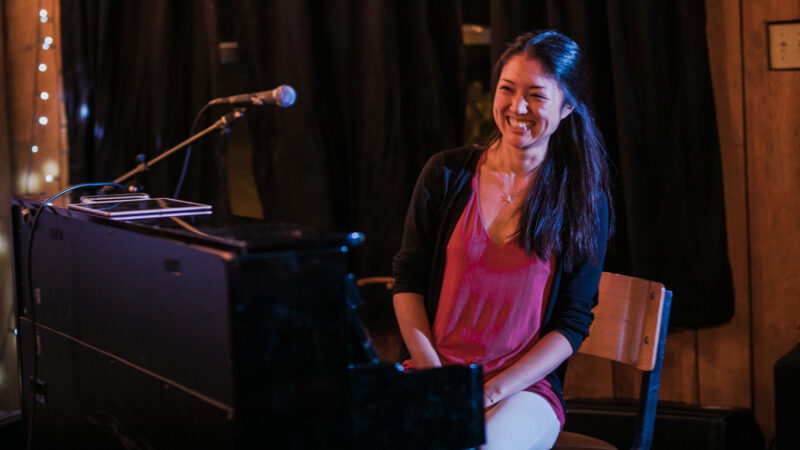How a pianist is using classical music to bridge divides in Alabama
By Kelsey Shelton, Reflect Alabama Fellow
For some people, classical music can be an unapproachable genre. Classically trained concert pianist, Miki Sawada, is aware of the impression classical music can impart on listeners. She has prestigious places on her resume including Yale University and Carnegie Hall.
“It can come with a lot of baggage with who it’s associated with. Traditionally, for example, we play a lot of music by white dead men from Europe. But classical music now, in 2023, is so much more than that,” she said.
The 2016 election sparked a change in her. The country was divided, and that division led her to an unlikely place – a U-Haul rental facility. She loaded an out-of-tune piano onto a van. Then she set out on a tour hoping to connect Americans using classical music.
“I think a lot of people’s reaction was to kind of ‘other’ the other people that were on the other side of the political spectrum or living in ways they weren’t familiar with,” Sawada said.
Sawada embarked on her Gather Hear tour in 2017. She planned to travel across all 50 states, performing classical music concerts for free in community gathering spaces rather than concert halls. She’s played at homeless shelters, churches, parks and nursing homes. She has toured five states so far. Alabama is her sixth. Her intention is to thoroughly explore every state, especially cities that don’t receive as much coverage.
“Instead of pushing people who are different from me away from me, I thought maybe I could use music as a way to truly get to know people in this country all across the socioeconomic and political divide,” she said.
For her shows in Alabama, she wanted to visit communities that are most in need of live music. Many are under-resourced and in rural areas. She also included incarcerated people with a performance at Staton Correctional Facility.
“As I found out in Louisiana, incarceration is a big issue in these states, Louisiana, Alabama. And I understand that so many people end up in prisons potentially for unjust reasons. I didn’t want to exclude that population from my tour because I’m really trying to reach everyone that represents Alabama,” she said.
Many locations where Sawada played are in majority Black communities. With that in mind, her set list features Black composers Florence Price, George Walker and William Grant Still. The pieces are paired with poetry by Alabama poets. She also has arrangements of African-American spirituals.
“Programmatically, I guess this time what feels most pertinent to me is that I’m finishing the whole program with ‘Deep River,’ which is, of course, singing about freedom on the other side of the Jordan River,” Sawada said.
She’s performed the spiritual at varying locations, from Japanese internment camp sites to underfunded Native American reservations. Though the song was written about freedom from slavery, it has remained relevant for a diverse group of people. She said it feels even more relevant now, during the Israel-Hamas conflict.
“Since I started the tour in 2017, the country has changed. I’ve changed as a person and performer. So the content of the show always tries to reflect what’s going on in the moment,” she said. “I definitely think about everything that’s happening currently while I’m on the tour. Because this tour is really like a living, breathing thing.”
That’s because Sawada is documenting the tour through video, blogs and social media. The tour’s website and YouTube channel are dedicated to highlighting the intimate moments she has shared with strangers. One show in Louisiana, ended with a duet of Amazing Grace with an unhoused person. In Marion, Alabama, Performances included young ballerinas.
“The documentation is almost as important as the in-person performance, because I wanted to personally get to understand America,” she said, “but also share what I’ve found to a broader audience that’s national, that’s international and show them: this is what America looks like.”
She hopes the tour will introduce America to a new side of classical music. One that shows the complexity of the genre – from the depth that can be created with one woman and a piano, to the power it has to bring people together during a time of isolation and division.
Click here for more information about Sawada’s Gather Hear tour in Alabama.
Mideast clashes breach Olympic truce as athletes gather for Winter Paralympic Games
Fighting intensified in the Middle East during the Olympic truce, in effect through March 15. Flights are being disrupted as athletes and families converge on Italy for the Winter Paralympics.
A U.S. scholarship thrills a teacher in India. Then came the soul-crushing questions
She was thrilled to become the first teacher from a government-sponsored school in India to get a Fulbright exchange award to learn from U.S. schools. People asked two questions that clouded her joy.
Sunday Puzzle: Sandwiched
NPR's Ayesha Rascoe plays the puzzle with WXXI listener Jonathan Black and Weekend Edition Puzzlemaster Will Shortz.
U.S.-Israeli strikes in Iran continue into 2nd day, as the region faces turmoil
Israel said on Sunday it had launched more attacks on Iran, while the Iranian government continued strikes on Israel and on U.S. targets in Gulf states, Iraq and Jordan.
Trump warns Iran not to retaliate after Ayatollah Ali Khamenei is killed
The Iranian government has announced 40 days of mourning. The country's supreme leader was killed following an attack launched by the U.S. and Israel on Saturday against Iran.
Iran fires missiles at Israel and Gulf states after U.S.-Israeli strike kills Khamenei
Iran fired missiles at targets in Israel and Gulf Arab states Sunday after vowing massive retaliation for the killing of Supreme Leader Ayatollah Ali Khamenei by the United States and Israel.








